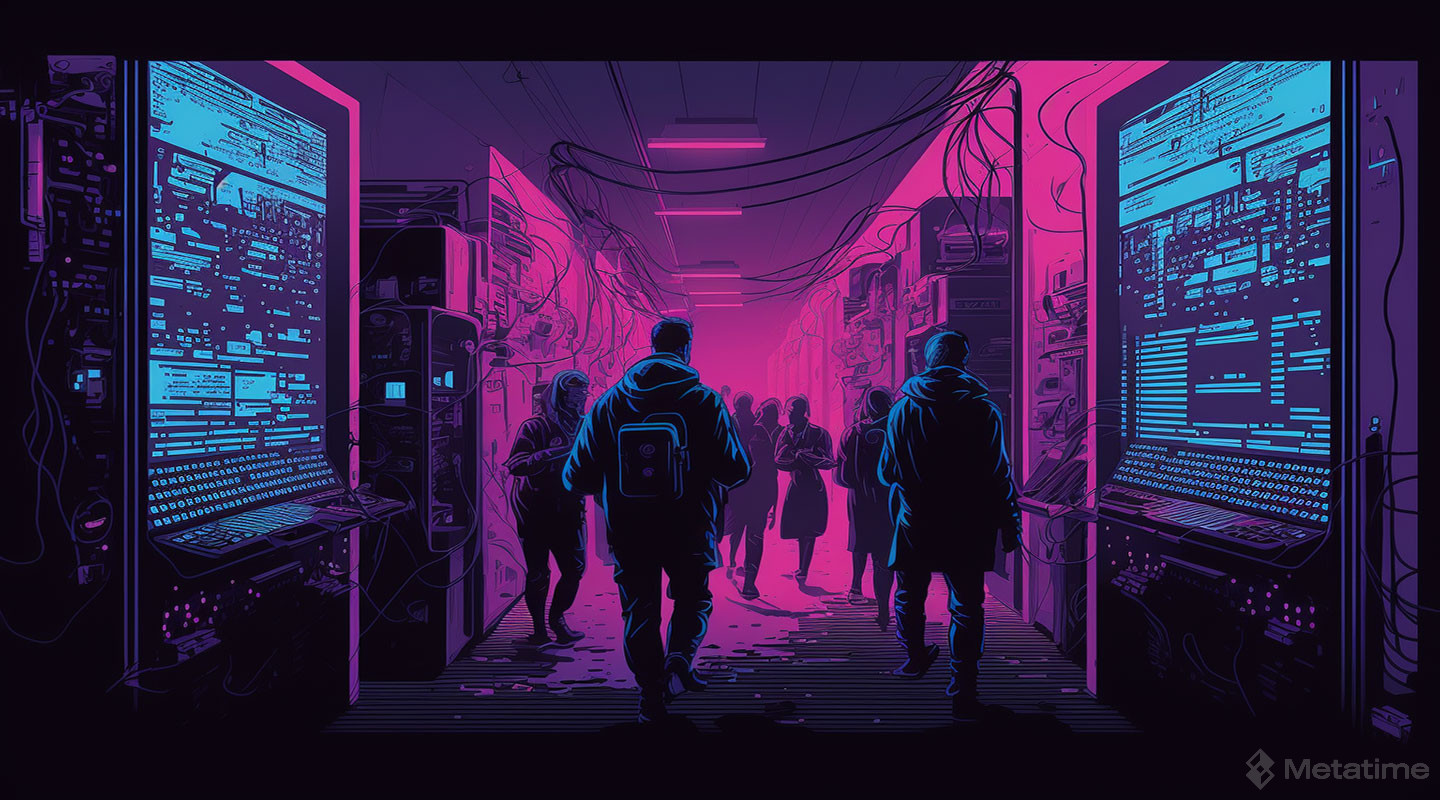The term cypherpunk is defined as an activist movement that emerged in the late 1980s. The concept of cypherpunk is derived from the word "cypher", meaning an algorithm that encodes and decodes data in special ways, and "punk", meaning anti-establishment. The Cypherpunk movement used cryptography to defend personal privacy and freedom.
Until the 1970s, cryptography was only used by government agencies and military departments. The US National Bureau of Standards and the National Security Agency (NSA) published the Data Encryption Standard algorithm developed by IBM in the 1970s.
In 1976, Whitfield Diffie and Martin Hellman published the paper "New Directions in Cryptography". The duo of Whitfield Diffie and Martin Hellman are known today as the pioneers of public-key cryptography. The Cypherpunk movement was inspired by this article published in 1976. By 1997, Cypherpunks had grown to a mailing list of almost 2000 subscribers.
Between 1996 and 1999, 30 messages were published in one day, discussing topics such as politics and philosophy. Cypherpunks also worked on multiple cryptography infrastructure applications. One of the projects developed by Cypherpunks is the privacy-focused program "Pretty Good Privacy (PGP)".
The technique of cryptography plays an important role in the blockchain and cryptocurrency space. Some of the most recognized names in the industry, such as Adam Back and Nick Szabo, are also Cypherpunk participants.
Cypherpunks advocated the centralization of the internet for people. Once governments became aware of the internet and realized its importance, they would move to monitor and censor it. According to the cypherpunks, the only way to ensure the freedom of the internet was through cryptography.

Who Are Popular Cypherpunks?
Cypherpunks are a community with a strong emphasis on privacy, freedom, and cryptography. Here are some of the popular names of Cypherpunk participants:
- Timothy C. May
- Julian Assange
- Phil Zimmermann
- Nick Szabo
How Did Cypherpunk and Cryptocurrencies Get Their Start?
The first article that started the cypherpunk movement was "Numbers Can Be a Better Form of Cash Than Paper" by David Chaum. In this article, the digitization of money was mentioned for the first time. The author of the article, David Chaum, also attempted a digital asset called "Digicash", but due to the conditions of the time, he could not achieve a successful result.
Blockchain was first mentioned by researchers Stuart Haber and W. Scott Stornetta in 1991. Stuart Haber and W. Scott Stornetta proposed the idea of applying an unalterable timestamp to digital data with blockchain technology. They also came up with a computational solution using computer power to keep documents secure and unaltered.
Another important document on the subject, the Crypto Anarchist Manifesto, was published in 1992. The manifesto talks about the ability of individuals and organizations to communicate in secrecy.
In the 1993 Cypherpunk Manifesto, it was mentioned that anonymous systems could use digital signatures and that money could be digitized.
The story of the manifesto begins in 1992 in San Francisco, USA, when Timoty May, Eric Hughes, and John Gilmore met to discuss their work and ideas regularly. The term Cypherpunk was coined through humor in one of these meetings. The agenda of the meetings was the politics and philosophy of cryptography, mathematics, computer science, and anonymity.
After the publication of the manifesto, the Cypherpunk list was created. Cypherpunk was first used in this mail system. Cypherpunk should not be confused with the term Cyberpunk, which means "High technology, low living standards".
During the 2008 crisis, on October 31, 2008, an email was sent to the Cypherpunk mailing list entitled "Bitcoin: A Peer-to-Peer Cash System." The Bitcoin article was influenced by the Cypherpunk movement. Cypherpunk has inspired many similar movements.
Cypherpunk has played an important role in the development of privacy-enhancing technologies for some time. As new technologies are developed every day, many innovations are emerging that affect the future of Cypherpunk
Cypherpunk Manifesto’suna aşağıda yer alan bağlantıyı kullanarak ulaşabilirsiniz.
You can access the Cypherpunk Manifesto using the link below.
www.activism.net/cypherpunk/manifesto.html

A Cypherpunk's Manifesto
by Eric Hughes
“Privacy is necessary for an open society in the electronic age. Privacy is not secrecy. A private matter is something one doesn't want the whole world to know, but a secret matter is something one doesn't want anybody to know. Privacy is the power to selectively reveal oneself to the world.
If two parties have some sort of dealings, then each has a memory of their interaction. Each party can speak about their own memory of this; how could anyone prevent it? One could pass laws against it, but the freedom of speech, even more than privacy, is fundamental to an open society; we seek not to restrict any speech at all. If many parties speak together in the same forum, each can speak to all the others and aggregate together knowledge about individuals and other parties. The power of electronic communications has enabled such group speech, and it will not go away merely because we might want it to.
Since we desire privacy, we must ensure that each party to a transaction have knowledge only of that which is directly necessary for that transaction. Since any information can be spoken of, we must ensure that we reveal as little as possible. In most cases personal identity is not salient. When I purchase a magazine at a store and hand cash to the clerk, there is no need to know who I am. When I ask my electronic mail provider to send and receive messages, my provider need not know to whom I am speaking or what I am saying or what others are saying to me; my provider only need know how to get the message there and how much I owe them in fees. When my identity is revealed by the underlying mechanism of the transaction, I have no privacy. I cannot here selectively reveal myself; I must always reveal myself.
Therefore, privacy in an open society requires anonymous transaction systems. Until now, cash has been the primary such system. An anonymous transaction system is not a secret transaction system. An anonymous system empowers individuals to reveal their identity when desired and only when desired; this is the essence of privacy.
Privacy in an open society also requires cryptography. If I say something, I want it heard only by those for whom I intend it. If the content of my speech is available to the world, I have no privacy. To encrypt is to indicate the desire for privacy, and to encrypt with weak cryptography is to indicate not too much desire for privacy. Furthermore, to reveal one's identity with assurance when the default is anonymity requires the cryptographic signature.
We cannot expect governments, corporations, or other large, faceless organizations to grant us privacy out of their beneficence. It is to their advantage to speak of us, and we should expect that they will speak. To try to prevent their speech is to fight against the realities of information. Information does not just want to be free, it longs to be free. Information expands to fill the available storage space. Information is Rumor's younger, stronger cousin; Information is fleeter of foot, has more eyes, knows more, and understands less than Rumor.
We must defend our own privacy if we expect to have any. We must come together and create systems which allow anonymous transactions to take place. People have been defending their own privacy for centuries with whispers, darkness, envelopes, closed doors, secret handshakes, and couriers. The technologies of the past did not allow for strong privacy, but electronic technologies do.
We the Cypherpunks are dedicated to building anonymous systems. We are defending our privacy with cryptography, with anonymous mail forwarding systems, with digital signatures, and with electronic money.
Cypherpunks write code. We know that someone has to write software to defend privacy, and since we can't get privacy unless we all do, we're going to write it. We publish our code so that our fellow Cypherpunks may practice and play with it. Our code is free for all to use, worldwide. We don't much care if you don't approve of the software we write. We know that software can't be destroyed and that a widely dispersed system can't be shut down.
Cypherpunks deplore regulations on cryptography, for encryption is fundamentally a private act. The act of encryption, in fact, removes information from the public realm. Even laws against cryptography reach only so far as a nation's border and the arm of its violence. Cryptography will ineluctably spread over the whole globe, and with it the anonymous transactions systems that it makes possible.
For privacy to be widespread it must be part of a social contract. People must come and together deploy these systems for the common good. Privacy only extends so far as the cooperation of one's fellows in society. We the Cypherpunks seek your questions and your concerns and hope we may engage you so that we do not deceive ourselves. We will not, however, be moved out of our course because some may disagree with our goals.
The Cypherpunks are actively engaged in making the networks safer for privacy. Let us proceed together apace.
Onward.”
Eric Hughes <[email protected]>
9 March 1993







